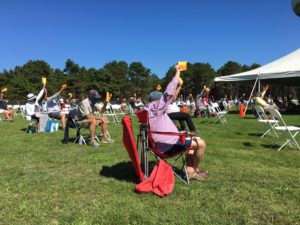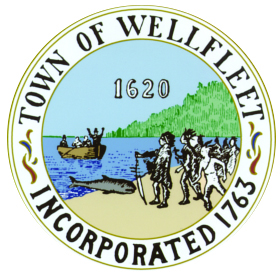WELLFLEET — At the Sept. 12 annual town meeting voters agreed to spend $110,000 to design a sprinkler system for the Wellfleet Elementary School, because, the fire chief said, one was not installed in a $4.5-million 1990 renovation.
Wellfleet Town Meeting
CIVICS
Wellfleet OK’s Water Main and Firefighters
Officials hit a home run at first-ever outdoor town meeting
WELLFLEET — Standing on the pitcher’s mound at the Wellfleet Elementary School ballfield, Moderator Dan Silverman pitched a no-hitter on Sept. 12, with voters approving all the articles that came before them at the town’s pandemic-inspired outdoor annual town meeting.
The crisp and sunny weather may have helped bring out 200 voters, double the reduced-because-of-Covid-19 quorum of 100. Many voters looked like they were in a witness protection program, with hats, sunglasses, and masks. But they sat far apart and got the business of town government done in just under four hours.
The sound system worked well, and voters were able to stay in their seats to ask questions by beckoning “microphone wranglers,” posted throughout the outfield with microphones on selfie sticks.
All the articles on the warrant were adopted, with the exception of those that were indefinitely postponed for various reasons, including the fact that four did not survive a Proposition 2½ override ballot on Sept. 8. Those were: a new police cruiser for $50,000; a fire command vehicle for $55,000; a public works backhoe for $168,000; and a new transfer station guard shack and canopy for $55,000.

Six budget overrides were approved both at the ballot and at town meeting. The most costly was for borrowing up to $3.8 million to replace a water main for the town’s secondary public water source. Jim Hood, chair of the water commissioners, said the town hopes to receive “a substantial portion” of the cost in grants.
The water main upgrade is to fulfill the state requirement for a secondary or backup system should the first fail. Wellfleet’s primary water source, the Boy Scout Camp wellfield near the Council on Aging, pumps more than enough water for the town’s current peak use: 100,000 gallons daily. Current peak daily use is just over 63,000 gallons. But the secondary water source on Gristmill Way uses a four-inch main that can handle only 40,000 gallons a day.
By replacing that with an eight-inch pipe, the neighborhoods of Old Hay Road, part of Route 6, and Briar Lane would also get access to town water. This could add 80 customers in all to the municipal system, including some on Briar Lane that do have water quality problems, Hood said. And since the water system is funded by user fees, additional hookups help spread the cost.
Lastly, an additional 9,000 gallons a day will be needed if the town is able to construct a proposed 46-unit affordable housing complex on Lawrence Road. Though this is within the capacity of the primary system, it would further tax the secondary system.
Select board member Helen Miranda Wilson said she didn’t like that proponents were unnecessarily tying the affordable housing project to the water main or that they were “recruiting” users to help pay for the water system.
“Hooking up people who don’t need water is environmentally a very bad idea,” Wilson said. “Groundwater is our most precious resource.”
Kathleen Bacon, a former select board member, said town meeting voters were actually sitting on top of the proposed affordable housing complex’s septic system. Tying the water to the housing project is a way to secure a state grant for the water expansion, she added. The necessary override for the project passed at the Sept. 8 election, 501 to 239.
Town meeting voters also agreed to hire two new firefighter-paramedics, which will allow the fire dept. to have three people on each shift for 24-hour coverage, said Fire Chief Richard Pauley. The $148,000 for salary and benefits is a permanent tax increase and will cost the owner of a $538,524 home $35.12 a year. It passed at the ballot, 460 to 280.
Voters also approved $110,000 to engineer a sprinkler system at the Wellfleet Elementary School. Somehow, Pauley explained, sprinklers were not included in a major school renovation in the early 1990s, although legally required. “Someone waived that requirement and it should not have been done,” Pauley said.
There was some debate about two petitioned articles, one a ban on the sale of single-use plastic water bottles, and the other a nonbinding referendum to change the state seal, which features a Native American image topped by a colonial swordsman’s disembodied arm.
Justina Carlson and Mike DeVasto, both select board members, said the ban on water bottles, which will go into effect on Sept. 1, 2021, encourages the use of carbonated beverages and Gatorade. People with jobs outside or on the water need to stay hydrated and may not be prepared for this ban.
“I think behavior shouldn’t be legislated,” said Carlson.
Carlson also argued against a petition to change the state seal. Though her own great-great-grandmother was “a full-blooded Cherokee Indian,” she said, she was not in favor of the “erasure of history.”
TOWN MEETING PREVIEW
Wellfleet Voters Will Be Asked to Spend $23 Million
One big budget increase was for porta-potties
WELLFLEET — The annual town meeting is set to kick off at 10 a.m. on Saturday, Sept. 12, five months after it was initially postponed because of the Covid-19 pandemic. It will be held outdoors, at the elementary school ballfield on Lawrence Road. Masks are required, and those seeking to attend the meeting will be screened for Covid symptoms and their temperatures taken.
The warrant includes 38 articles and total proposed expenditures of $23,076,473, which represents a 3.7-percent increase over last year’s total.
The fiscal 2021 town operating budget to be presented at the meeting totals $20,232,924, a 6.3-percent increase over 2020. Proposed capital expenditures and debt service, however, are both lower than last year.

A significant chunk of the final amount approved at the meeting will depend on the 10 big-ticket items on the warrant, all major purchases involving budget overrides and exemptions from Proposition 2½ limits.
“The big purchases are always a deciding factor,” said Fred Magee, the finance committee chair. “In theory, you could not spend any of that money, or you could spend all of it.”
Several of the larger items are for vehicles and infrastructure for the fire and police depts. and the dept. of public works. The largest item, though, is the proposed $3.8 million for a new secondary water piping system.
With concern about town revenues being lower due to effects of the pandemic, the large number of big money items on the warrant concerns some townspeople, including former select board member Kathleen Bacon, who chose not to run for re-election this year.
“I see that police, fire, and DPW have some big-ticket items on the warrant, and I’m a little surprised at it because of Covid,” she said. “I believe the revenue of the town will be down for fiscal year 2021.”
Bacon is most concerned that the other big purchases will distract attention from what she sees as a crucial item on the warrant, upgrading the water system.
Initially installed in 1989, the current secondary water piping system is at the edge of its capacity. Although able to handle the existing water pressure for the households that are currently connected to the system, the antiquated pipes would not be able to accommodate the addition of 46 affordable housing units planned for 95 Lawrence Road.
Because only 2.45 percent of Wellfleet’s housing is deemed affordable, far below the state’s goal of 10 percent, Bacon said the new water system should trump the other purchases.
Magee, though, said that arguing against other proposed purchases will not be that easy.
“Most recommendations that the finance committee makes are based on budgets that are presented to us,” he said. “If the fire dept. needs a fire truck, we ask if there is an off-market or used one we can get to save money. If the answer is no, then it’s no, and then you are back to ‘We need a fire truck.’ You don’t want the fire dept. without a fire truck.”
Other than major purchases, one of the largest operating budget line item increases this year is under community services.
Last year, the department’s operating expenses were $75,750. This year they are up to $211,899, thanks to the porta-potty contract the town signed with M.A. Frazier Inc.
As a Covid health measure, the town deemed porta-potties easier to clean than regular bathrooms, and therefore placed porta-potties and handwashing stations at public places like beaches and parking lots, Community Services Director Suzanne Grout Thomas said.
Another noticeable line item increase is under “Barnstable County Retirement Assessment.” The town’s employee retirement fund is managed by the county, as it is for all Cape towns, Town Administrator Maria Broadbent said. Wellfleet’s share went up by $158,881 this year to $1,406,557.
The increase is nothing out of the ordinary, Magee said.
“People are always the largest component in operating budgets because of salaries, benefits, all that stuff,” he said. “That’s true all the way to the highest levels of government.”
One of the more controversial nonbudget articles on the warrant is Article 16, which deals with a proposed multi-part restoration plan for the Pleasant Hill Cemetery.
The select board unanimously voted against the plan; it is the only article that received a 0-5 vote from the board.
According to Ryan Curley, the newest member of the select board, the work that the Wellfleet Cemetery Commission has done to date is unacceptable.
“The quality of the work that has been done is not good and has likely caused permanent damage to many grave markers,” Curley wrote. “Addressing these issues is hard because the intention of the commission is good, and there is an obvious need for a restoration program, but the results are atrocious.”
The issue, Curley said, is not with the commission itself, but with Robert Devaney, who was hired as a contractor to repair damage at the cemetery.
Some of the problems include resetting headstones crooked, painting plaster over inscriptions, and using white gel epoxy instead of paste to fill cracks in stones.
Curley said, “It will cost more money to do it the right way,” but it’s a cost he deems appropriate, considering the importance of keeping gravestones in good condition.
The final town meeting warrant published online also contains a typo under article 27. The document says that the Open Space Committee recommended the article by a vote of 0-0. Vice-Chair Thomas Slack confirmed that the committee voted to recommend the article 7-0.
